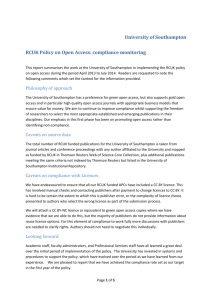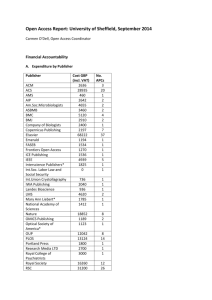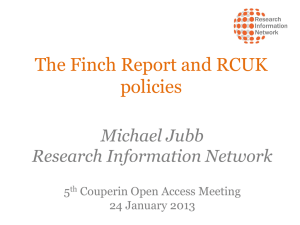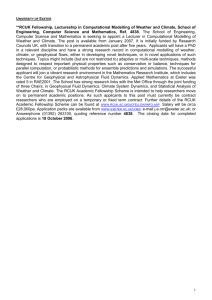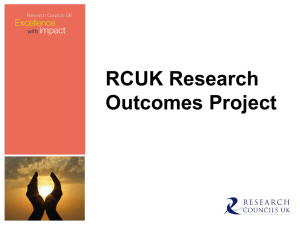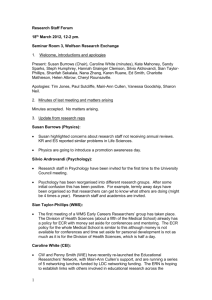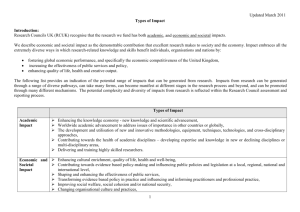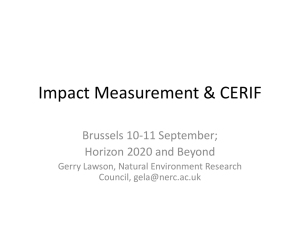RCUK Policy on Open Access and Supporting Guidance Introduction
advertisement
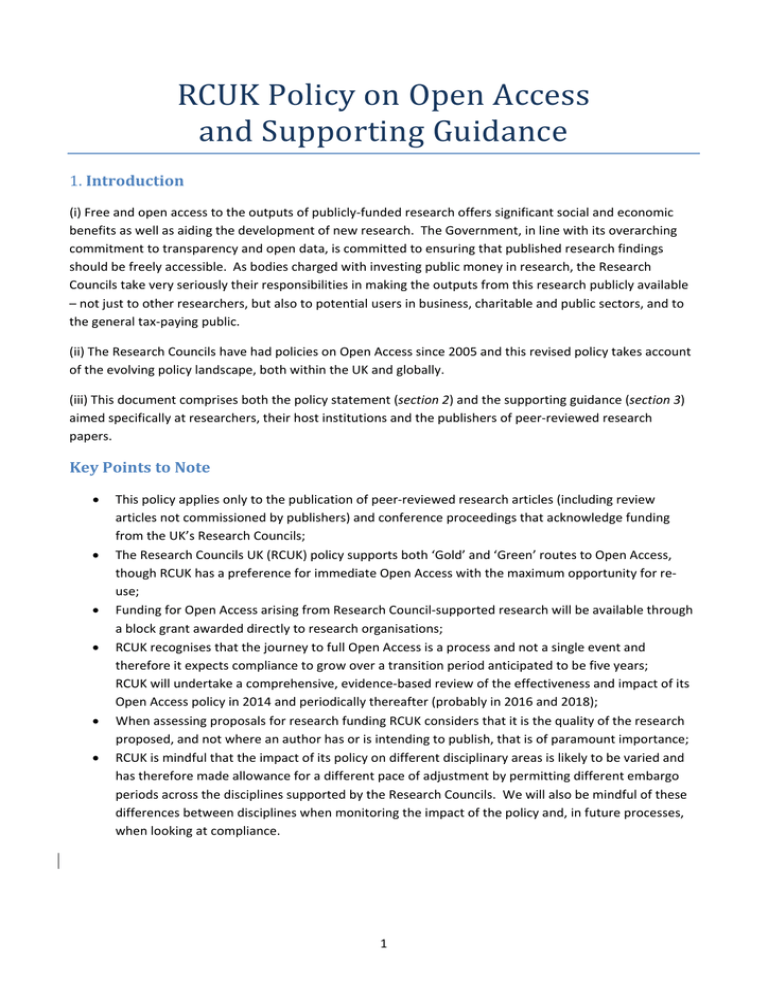
RCUKPolicyonOpenAccess andSupportingGuidance 1.Introduction (i) Free and open access to the outputs of publicly‐funded research offers significant social and economic benefits as well as aiding the development of new research. The Government, in line with its overarching commitment to transparency and open data, is committed to ensuring that published research findings should be freely accessible. As bodies charged with investing public money in research, the Research Councils take very seriously their responsibilities in making the outputs from this research publicly available – not just to other researchers, but also to potential users in business, charitable and public sectors, and to the general tax‐paying public. (ii) The Research Councils have had policies on Open Access since 2005 and this revised policy takes account of the evolving policy landscape, both within the UK and globally. (iii) This document comprises both the policy statement (section 2) and the supporting guidance (section 3) aimed specifically at researchers, their host institutions and the publishers of peer‐reviewed research papers. KeyPointstoNote This policy applies only to the publication of peer‐reviewed research articles (including review articles not commissioned by publishers) and conference proceedings that acknowledge funding from the UK’s Research Councils; The Research Councils UK (RCUK) policy supports both ‘Gold’ and ‘Green’ routes to Open Access, though RCUK has a preference for immediate Open Access with the maximum opportunity for re‐ use; Funding for Open Access arising from Research Council‐supported research will be available through a block grant awarded directly to research organisations; RCUK recognises that the journey to full Open Access is a process and not a single event and therefore it expects compliance to grow over a transition period anticipated to be five years; RCUK will undertake a comprehensive, evidence‐based review of the effectiveness and impact of its Open Access policy in 2014 and periodically thereafter (probably in 2016 and 2018); When assessing proposals for research funding RCUK considers that it is the quality of the research proposed, and not where an author has or is intending to publish, that is of paramount importance; RCUK is mindful that the impact of its policy on different disciplinary areas is likely to be varied and has therefore made allowance for a different pace of adjustment by permitting different embargo periods across the disciplines supported by the Research Councils. We will also be mindful of these differences between disciplines when monitoring the impact of the policy and, in future processes, when looking at compliance. 1 2.RCUKPolicyonOpenAccess Aim of the Policy The Research Councils work to ensure that the public investment in research secures the maximum economic and societal return. One of the ways of achieving this is through Open Access. The RCUK Policy on Open Access aims to achieve immediate, unrestricted, on‐line access to peer‐reviewed and published research papers, free of any access charge. Our vision is for all users to be able to read published research papers in an electronic format and to search for and re‐use (including download) the content of published research papers, both manually and using automated tools (such as those for text and data mining), provided that any such re‐use is subject to full and proper attribution. Scope The policy applies to peer‐reviewed research articles (including review articles not commissioned by publishers), which acknowledge Research Council funding, that are submitted for publication from 1st April 2013, and which are published in journals or conference proceedings. Expectations for Researchers Researchers, as the generators of all of the research papers and responsible for much of their peer review, are expected to publish any peer‐reviewed research papers which acknowledge Research Council funding in journals that are compliant with the RCUK policy on Open Access. All papers must include details of the funding that supported the research and, if applicable, a statement on how the underlying research materials – such as data, samples or models – can be accessed. Compliance of Journals RCUK recognises a journal as being compliant with this policy if: The journal provides, via its own website, immediate and unrestricted access to the final published version of the paper, which should be made available using the Creative Commons Attribution (CC BY) licence, and allows immediate deposit of the final published version in other repositories without restriction on re‐use. This may involve payment of an ‘Article Processing Charge’ (APC) to the publisher. Or, The journal consents to deposit of the final Accepted Manuscript in any repository, without restriction on non‐commercial re‐use and within a defined period. No APC will be payable to the publisher. In this latter case, in STEM disciplines, RCUK will accept a delay of no more than six months between on‐line publication and the final Accepted Manuscript becoming Open Access. In the case of papers in the arts, humanities and social sciences (which will mainly be funded by the AHRC and the ESRC), the maximum embargo period will be twelve months. Where funding for APCs is unavailable to an author during the transition period, longer embargo periods will be allowable (see section 3.6). For definitions of Open Access see section 3.1 For definitions of what is and is not covered under the policy see section 3.2 For further details on acknowledgment of funding sources and underlying research material see section 3.3 For further details on: APCs: section 3.5 Embargos: section 3.6 Licences: section 3.7 Repositories: section 3.8 Accepted Manuscripts: section 3.9 Transition period: section 3.10 RCUK recognises that copyright in the manuscript itself normally remains with the author, as reflected in the historical right and tradition of authors to publish online manuscript versions of their papers even before submission, and this will continue. Article Processing Charges From 1st April 2013 the payment of APCs and other publication charges related to For further details on: APCs: Research Council‐funded research are supported through RCUK OA block grants section 3.5 provided to eligible research organisations. APCs and other publication charges 2 RCUK OA block relating to peer‐reviewed research papers can no longer be included within research grant applications. Expectations for Research Organisations Eligible research organisations in receipt of RCUK OA block grants are expected to establish institutional publication funds, and processes to manage and allocate the funds available for OA charges and other publication costs. Institutions may use the block grant in the manner they consider will best deliver the RCUK Policy on Open Access in a transparent way that allocates funds fairly across the disciplines and across researchers at different stages in their careers. RCUK expects that the primary use of the block grant will be for payment of APCs. We expect research organisations in receipt of an RCUK OA block grant to comply with the monitoring arrangements that will be put in place by the RCUK for this policy. Implementation and compliance RCUK will allow some flexibility in implementation of its policy, including regarding the length of embargo periods, during the transition period. An evidence‐based review of the implementation will take place in 2014 with an independent chair and including membership drawn from various quarters. Subsequent reviews will take place periodically as the transition progresses (probably in 2016 and 2018). 3 grant: section 3.4 Allowable costs within research applications: section 3.11 For further details of: RCUK OA block grant: section 3.4 Institutional publication funds: section 3.12 Monitoring: section 3.14 For further details of: Embargo periods: section 3.6 Transition phase: section 3.10 2014 review: section 3.13 Monitoring: section 3.14 3.GuidancefortheRCUKPolicyonOpenAccess 3.1DefinitionsofOpenAccess (i) RCUK defines Open Access as unrestricted, on‐line access to peer‐reviewed and published research papers. Specifically a user must be able to do the following free of any access charge: Read published papers in an electronic format; Search for and re‐use the content of published papers both manually and using automated tools (such as those for text and data mining) provided that any such re‐use is subject to full and proper attribution and does not infringe any copyrights to third‐party material included in the paper. (ii) RCUK considers that the ‘content’ of a paper includes, but is not limited to, the text, data, images and figures within a paper. (iii) There are various models for achieving open access, some of which allow more immediate access. RCUK has a preference for immediate, unrestricted, on‐line access to peer‐reviewed and published research papers, free of any access charge and with maximum opportunities for re‐use. This is commonly referred to as the ‘gold’ route to Open Access. We are supporting this preference with block grants to eligible research organisations in order to fund the associated article processing charges (APCs). Although this is our preference, we allow a mixed approach to Open Access; and the decision on which model to follow remains at the discretion of the researchers and their research organisations. 3.2Whatiscoveredbythepolicy? (i) This policy covers all peer‐reviewed research and review articles normally published in academic journals or conference proceedings, and which acknowledge Research Council funding. The policy does not cover monographs, books, critical editions, volumes and catalogues, or forms of non‐peer‐reviewed material. However, RCUK encourages authors of such material to consider making them Open Access where possible. (ii) While RCUK recognises that many researchers derive value from sharing early versions of papers (for example, by using the arXiv pre‐print archive), RCUK will consider only versions ‘as accepted for publication’ when assessing compliance with its policy (see section 3.9). 3.3Acknowledgementoffundingsourcesandunderlyingresearchmaterial (i) The policy requires funding information to be included within the acknowledgement section of a paper. Guidance on how to acknowledge funding information is provided by the Research Information Network1. (ii) As part of supporting the drive for openness and transparency in research, and to ensure that researchers think about data access issues, the policy requires all research papers, if applicable, to include a statement on how underlying research materials, such as data, samples or models, can be accessed. However, the policy does not require that the data must be made open. If there are considered to be compelling reasons to protect access to the data, for example commercial confidentiality or legitimate sensitivities around data derived from potentially identifiable human participants, these should be included in the statement. 1 See http://rinarchive.jisc‐collections.ac.uk/system/files/attachments/Acknowledgement‐funders‐guidance.pdf 4 3.4RCUKOABlockGrant (i) Research Councils have in the past provided support for APCs through both direct and indirect costs as part of grant funding. From 1 April 2013 RCUK will contribute to the payment of APCs for articles arising from grant‐funded research through block grants to research organisations in receipt of substantial RCUK funding. Research grant and fellowship applications with start dates on or after 1st April 2013 are no longer permitted to include provision for Open Access publication or other publication charges in respect of peer‐ reviewed journal and review articles and peer‐reviewed conference papers. (ii) The RCUK OA block grant is intended principally to support the payment of APCs. However, Research Organisations may use the block grant in the manner they consider will best deliver the RCUK Policy on Open Access, as long as the primary purpose to support the payment of APCs is fulfilled. The payment of colour charges and page charges may also be taken from the block grant at the discretion of the managing research organisation which should keep in mind the overall purpose of the block grant which is to support the payment of APCs. (iii) It is planned that the funding provided by Research Councils to support open access will be increased over the next five years until all published peer‐reviewed papers which derive from Research Council funding are open access (whether published via the ‘gold’ or ‘green’ routes). This increase in funding during transition reflects an estimate of the time that will be needed for researchers, institutions and publishers to make the transition to a fully Open Access model. It will also allow publication funding already provided through direct and indirect costs on current grants to be fully utilised. (iv) The RCUK policy also applies to research papers produced by the Research Councils’ own institutes. Additional funding arrangements will be established to support papers arising from research that they undertake. The same, or more demanding, Open Access targets and compliance expectations will apply to Research Council institutes. (v) Further detail on how the block grant is allocated and the level of funding can be found in RCUK’s announcement, made in November 20122. 3.5ArticleProcessingCharges (i) Where the RCUK OA block grant is used to pay Article Processing Charges for a paper, the paper must be made Open Access immediately at the time of on‐line publication, using the Creative Commons Attribution (CC BY) licence. (ii) RCUK does not specify an upper or lower limit on the level of APCs to be paid out of the block grant. The block grant is based on estimates of the numbers of papers produced and on the average APC cited in the Finch Report. RCUK expects that institutions and bodies such as JISC Collections, Research Libraries UK and the Society of College, National and University Libraries (SCONUL) will work together to negotiate appropriate APCs with publishers. In this context, it is important to recognise that the Research Councils fund only part of the total research effort in the UK, and that the RCUK block grant is not to be considered the only public funding that research organisations may use to support Open Access: it is legitimate to use funding received through, for example, Funding Council QR allocations to pay APCs. (iii) A number of research organisations that receive Research Council funding are not in receipt of an RCUK OA block grant. If evidence can be provided that this is causing significant problems, we will consider this as 2 See www.rcuk.ac.uk/media/news/2012news/Pages/121108.aspx 5 part of the 2014 review. If a research organisation has no public funding available to pay APCs, then its researchers will be able to publish under the green model with longer embargo periods (see section 3.6 below). 3.6Embargoperiods (i) Ideally, a research paper should become Open Access as soon as it is published on‐line. However, RCUK recognises that, in the green model of open access, embargo periods are currently used by some journals with business models that depend on generating revenue through journal subscriptions. Therefore, where a journal does not offer an immediate Open Access option, RCUK will accept a delay between on‐line publication and a paper becoming Open Access of no more than six months, in STEM disciplines. (ii) Because six‐month embargo periods can be particularly difficult in the arts, humanities and social sciences (which are mainly funded by the AHRC and the ESRC), RCUK will accept a delay of up to twelve months for such articles. RCUK wishes to work towards enabling a maximum embargo period of six months for all research papers, but recognises that the pace of change may vary by discipline. We will therefore ensure that the variable pace of change across disciplines, if any, is a key consideration in the forthcoming reviews on the basis of the evidence presented to them. (iii) The choice of route to Open Access remains with the researchers and their research organisations and, where funding for APCs is unavailable during the transition period, longer embargo periods will be allowable. In such a case we would expect the paper to be published in a journal with maximum embargos of 12 months, for STEM disciplines, or 24 months in the arts, humanities and social sciences (which will mainly be funded by the AHRC and the ESRC). This is consistent with the Government’s response to the Finch report3. (iv) Research papers in biomedicine should be published immediately, or with an embargo period of no longer than six months, as has been the MRC’s mandated policy since 2006. (v) This flexibility for embargo periods during the transition is reflected in the following decision tree for publicly funded research, created by the Publishers’ Association4. When using the decision tree it should be noted that although our preference is for immediate, unrestricted open access (‘Gold’), we allow a mixed approach to Open Access, and the decision on which route to follow – gold or green – remains at the discretion of the researchers and their research organisations 3 Accessibility, sustainability, excellence: how to expand access to research publications. Report of the Working Group on Expanding Access to Published Research Findings, June 2012 (see http://www.researchinfonet.org/wp‐ content/uploads/2012/06/Finch‐Group‐report‐FINAL‐VERSION.pdf). 4 From http://www.publishers.org.uk/index.php?option=com_docman&task=doc_download&gid=780&Itemid= 6 3.7Licences (i) Where Research Council funds are used to pay the APC for an Open Access paper, we require that the publisher makes the paper freely available under a Creative Commons Attribution (CC BY) licence5. This is the standard licence used by open access journals, and supports the maximum dissemination and re‐use of published papers, whilst protecting the moral rights of authors. It allows others to distribute, remix, manipulate, and build upon a paper, including commercially, as long as they credit the authors for the original paper and do not infringe any copyrights to third‐party material included in the paper. The use of CC BY where an APC is paid is also the policy of the Wellcome Trust. (ii) The CC BY licence opens up possibilities for new areas of research by the re‐use of papers, and the content of papers through text and data mining, and for new ways of disseminating research by being able to re‐present papers in innovative and potentially value‐adding ways. Crucially, the CC BY licence removes any doubt or ambiguity as to what may be done with papers, and allows re‐use without having to go back to the publisher to check conditions or ask for specific permissions. (iii) Concerns have been raised with RCUK of potential issues regarding use of the CC BY licence. These include: Loss of commercial revenue to publishers through sale of reprints – especially significant for some biomedical journals; Unwillingness of third‐parties to allow their material to be reproduced in research papers that are licensed using CC BY; More easily enabling misattribution, misquoting, misrepresentation, plagiarism, or otherwise referencing material out of context, which may be damaging to the interests of authors. (iv) CC BY is currently used by many journals, predominantly within the STEM sector, and along with the Creative Commons organisation, they report no significant problems with the use of the CC BY licence. 5 See http://creativecommons.org/licenses/ 7 However this is a developing area and RCUK will ensure that the 2014 review, and subsequent reviews, include an assessment of the impact of the use of CC.BY especially within the Arts, Humanities and Social Science disciplines. This will be monitored through active engagement with the various academic communities and their publishers. (v) RCUK will work with JISC and the UK Open Access Implementation Group to produce guidance (expected by the end of 2013) on the use of CC BY licences, including how to identify effectively third‐party material included within a paper licensed under CC BY. (vi) Where Open Access is achieved through deposit of the final Accepted Manuscript in a repository (the ‘Green’ route) in order to maximise the opportunities for access to and re‐use of repository content, the Research Councils would like research papers to be made available using the most liberal and enabling licences, ideally CC BY. However, the RCUK policy requires only that the manuscript is made available without restriction on non‐commercial re‐use. The policy does not specify a particular licence, and the requirement can be met by use of the Creative Commons Attribution‐non‐commercial licence (CC BY NC). Publisher‐specific licences6 are acceptable providing they support the aims of the policy, and allow re‐use including non‐commercial text and data mining. 3.8Repositories (i) The choice of repository is normally at the discretion of the author and their research organisation. However, some Research Councils have a requirement that papers must be deposited in specific repositories. This is detailed in the terms and conditions of grants from individual Research Councils. (ii) Institutional and subject repositories should include open access and funder metadata in a format that allows consistent aggregation and searching. RCUK is cooperating with the JISC Repository Interoperability (RIOxx) and Vocabularies For Open Access (V4OA) projects to develop a UK repository metadata standard, and expects this to be available for adoption by UK repositories from July 2013 onwards. 3.9AcceptedManuscripts (i) The Accepted Manuscript is the version of a journal article submitted by an author that has been accepted for publication in a journal, and that has been through a peer‐review process. Peer‐review is a crucial part of the quality assurance process for research, and RCUK wants to ensure that all users have access to research papers that have been peer‐reviewed. (ii) While RCUK recognises that many researchers derive value from sharing early versions of papers (for example, by using the arXiv pre‐print archive), RCUK will consider only versions ‘as accepted for publication’ when assessing compliance with its policy. (iii) The Accepted Manuscript is also known as the Author’s Manuscript, the Author’s Accepted Manuscript or as the Postprint. It is also worth noting that it is normal for authors to retain copyright of their Accepted Manuscript, and we expect this to continue. 3.10TheTransitionPeriod (i) We anticipate that the transition to full implementation of this policy may be around five years in duration but that this will depend on how the Open Access landscape evolves. During the transition we expect 6 For example that for the Nature Publishing Group ‐ http://www.nature.com/authors/policies/license.html 8 researchers and their institutions to follow the spirit of the policy and strive to achieve full compliance. As the available funding for Open Access increases during the transition, so will our expectations of the extent of compliance. At the end of the transition period we expect researchers and institutions to be fully compliant with the policy, and for 100% of research papers arising from the research we fund to be published in journals that are compliant with our policy on Open Access. (ii) In year one research organisations are expected to ensure that a minimum of 45% of their research papers are published Open Access, via either route. This rises to 53% in the second year. The choice of route to Open Access, as long as it complies with the RCUK policy, remains with the author and their research organisation. (iii) Our aim is that, by the end of the five year transition period, 75% of Open Access papers from the research we fund will be delivered through immediate, unrestricted, on‐line access with maximum opportunities for re‐use (‘gold’). 3.11AllowablecostswithinResearchApplications (i) From now on research grants and fellowships, with start dates on or after 1st April 2013, will not include provision for Open Access publication or other publication charges in respect of peer‐reviewed research papers. This does not affect grants already awarded. Any funds specified for APCs within already awarded grants should be used before using the RCUK OA Block Grant. (ii) It remains permissible for grant proposals to request publication costs associated with the production of other types of research outputs that are not covered currently by the RCUK OA policy. Publication costs for outputs such as monographs, books, critical editions, volumes and catalogues may be requested but, as with any cost, they will still need to be fully justified within the application. (iii) Where an existing grant has been awarded with provision for APCs as part of the direct costs, research organisations should manage and report against these charges using the same mechanisms used to report on the use of the OA block grant (see section 3.14). 3.12InstitutionalPublicationFunds (i) As recommended by the Finch report, research organisations should establish Institutional Publication Funds to meet the costs of APCs for Open Access publishing, and the processes and procedures to allocate the funding they contain. The RCUK OA block grant should be managed within the context of the institutional fund, as should funding received from other sources to support payment of APCs. 3.13Reviewsofthepolicyandimplementation (i) RCUK recognises that implementation of its policy on Open Access will require a major change in the way researchers, institutions and publishers manage the process of publishing and disseminating the results of the research that the Research Councils fund. RCUK is also asking that this cultural shift takes place over a relatively short period of around five years. For these reasons, RCUK sees the transition to Open Access as a journey and not as a single event. (ii) The amount of funding provided by RCUK to support Open Access in years 1 and 2 is based on an estimate of the likely costs. RCUK will monitor how institutions use this money, and would like institutions to work with us to provide the evidence necessary to inform the review which will take place in 2014. Only 9 with evidence can RCUK properly understand how its Open Access policy is working and, for example, set the block grants at a level appropriate to achieve the compliance we require. (iii) Our review will be thorough. Issues that we intend to examine include: The international Open Access landscape; The impact of the policy and its implementation on: o different disciplines o peer review o collaboration between researchers both within the UK and internationally; The best mechanisms for monitoring and ensuring compliance with the policy; The level of RCUK OA block grant awarded to eligible research organisations; The impact of different licences, especially CC BY, on different disciplines; The duration of embargos for different disciplines and the extent of transition period dispensations; The overall costs of the publication of research keeping in mind that publishers’ subscription charges will continue to be paid in many cases; The costs to institutions of managing the RCUK OA block grant system; The balance of routes to Open Access preferred by researchers and their research organisation; Any adverse consequences (for example on the sustainability of Learned Societies). (iv) We acknowledge that for some of these areas there will be limited evidence available in time for the 2014 review. Therefore, it is planned that there will be subsequent reviews, probably in 2016 and 2018 where further evidence can be considered. (v) The reviews will be evidence‐based. We are keen to ensure that there is continued engagement with researchers, research organisations, learned societies and publishers both during the implementation period and beyond. The 2014 review will have an independent chair and include independent membership. The format for subsequent reviews will be determined following the review in 2014. (vi) The outcomes of the reviews will be used to inform any necessary policy changes and to model future funding requirements for the policy. 3.14Collectionofevidenceforthe2014review (i) As part of collecting evidence for the 2014 review RCUK will wish to: (a) measure the impact of Open Access across the landscape including use of both immediate publishing (‘Gold’) and the use of repositories (‘Green’), and (b) seek to re‐test the planning assumptions used to set the initial volume of funding allocated to support Open Access, and the distribution of OA block grants to research organisations. (ii) To do this RCUK wants to understand how the OA block grants are being used, specifically the numbers of research papers which are being made open access through payment of an APC and the actual APCs being paid. RCUK will also be looking for evidence that APC funding is being used equitably across disciplines. Building an understanding of how many papers are being made available in Open Access formats through deposit in repositories, without payment of APCs, will also be essential. (iii) To allow RCUK to do this, we will need information about research papers that have been made Open Access via both models, and how the RCUK OA block grants have been spent. RCUK will make the data it 10 collects publicly available in order to ensure maximum transparency on implementation of its policy and on the payments made to publishers for APCs and other publication costs. (iv) RCUK recognises that any reporting requirement must not impose an undue administrative burden on research organisations, and should therefore be restricted to the minimum information required. In the longer‐term, we envisage ROS and Researchfish or any successor reporting systems will provide the most appropriate means to gather this information. We will work with research organisations and publishers to ensure we are using available data sources, and hence collecting from research organisations only data essential for the review, and which we cannot source elsewhere. (v) RCUK will work with Research Organisations to refine and agree the minimum achievable level of reporting, and the mechanisms to gather the necessary data. This will form part of the ‘HEI Best Practice Project’ that RCUK is supporting the Research Information Network to undertake. (vi) For each publication, we think we will need to know the digital object identifier (DOI), and indications of whether the article is accessible via gold, green or another route, whether it acknowledges Research Councils funding and includes a statement on access to underlying research materials For articles which are not made immediately open access with a CC‐BY licence on the publisher’s website, we will need a URL, as well as a statement of the length of the embargo period and the licence conditions. This information will be available from the ROS/Researchfish and Sherpa/FACT systems, supplemented by details harvested from the acknowledgement sections of papers. In summary at article level we propose collecting information as set out below: Information: All articles Source DOI ROS / Researchfish Gold*/Green/Other/not known ROS / Researchfish Whether CC.BY applies Sherpa/FACT service (based on Journal‐level data) Whether article carries Funder Random dipstick checking by RCs (incl. through Acknowledgement use of available bibliometric data e.g. Web of Science data) Article carries statement on access to underlying Random dipstick checking by RCs (incl. through research materials use of available bibliometric data e.g. Web of Science data) Information: All articles not made immediately Source OA with CC‐BY on publisher’s website URL ROS / Researchfish Embargo period – Sherpa/FACT service (based on Journal‐level data) 11 * Defined as made immediately OA with CC BY on publisher’s website (vii) To review how the block grant is being used (including for accountability purposes), RCUK will require the Research Organisation to submit a short financial report setting out expenditure by named publishers, together with brief description of other uses made of the grant to work towards full open access for publications covered by this policy. The proposed template can be found in Annex A. Research Councils UK 8th April 2013 12 Annex A – Proposed Template for Data Collection Section A – ‘Expenditure by Publisher’ To include all spend connected with publishing individual articles, i.e. APCs, page charges, colour charges, etc. Publisher A £ ‐ Number of articles published as a result of this spend Publisher B £ ‐ Number of articles published as a result of this spend Publisher C £ ‐ Number of articles published as a result of this spend Publisher D £ ‐ Number of articles published as a result of this spend etc… (add rows as necessary) Section B Other Expenditure Analysis Other Expenditure to achieve OA – 1 Other Expenditure to achieve OA – 2 Other Expenditure to achieve OA – 3 etc. Brief description (500 characters incl. punctuation and spaces) of £ ‐ activity funded Brief description (500 characters incl. punctuation and spaces) of £ ‐ activity funded Brief description (500 characters incl. punctuation and spaces) of £ ‐ activity funded (add rows as necessary) sub‐total paid to publishers: £ ‐ sub‐total of other expenditure: £ ‐ Balance of block grant remaining If balance is negative, a brief description (500 characters including punctuation and spaces) of source of funds used in addition to RCUK block grant £ ‐ To enable us to carry out the planned review of the policy and its implementation in 2014 Q4, we will expect the first financial report using this template to cover the period 1 April 2013 to 31 July 2014. 13

